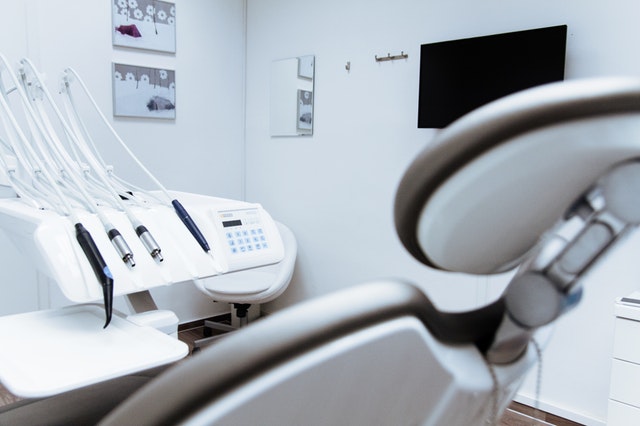
Do you have unexplained jaw or facial pain? Constant headaches? Trouble chewing? You may be suffering from an often overlooked condition called temporomandibular joint disorder, or TMJ disorder. Characterized by pain and limited movement in the jaw and surrounding muscles, the temporomandibular joint disorder can be a painful and debilitating condition.
Fortunately, TMJ disorder can be managed and treated. We’ve outlined what you need to know about the condition below so you can properly diagnose and seek out treatment from your dentist.
What are Temporomandibular Joints?
Your temporomandibular joints are located on the base of the skull in front of the ear structure on both sides and connect the lower jaw to the upper jaw. These joints work in conjunction with your muscles, bones, discs, and ligaments to allow support and function of our lower jaw.
Temporomandibular Joint Disorder (often commonly referred to as TMD or TMJ), is when these joints are not working properly.

Photo credit: reallyboring via VisualHunt / CC BY-NC-SA
What Causes TMJ?
Your temporomandibular joints work similar to a door hinge in conjunction with a sliding motion. The parts of your jaw bone that interact with the joint are covered in cartilage and separated by a small shock absorbing disc. Generally, this movement is smooth, but a couple things can happen to cause disruption and make the jaw twist when you have movement in your face:
- Grinding or clenching your teeth
- Stress, as this often causes a tightening of your facial muscles or jaw
- Dislocation or erosion of the disc between the ball and socket of the joint
- Osteoarthritis or rheumatoid arthritis in the temporomandibular joints
- A jaw, neck, or head injury
Risk Factors of TMJ
There are a number of things that can increase your chances of getting TMJ, including:
- A misaligned bite
- A previous injury to the jaw
- Chronic grinding or clenching of teeth
- Connective tissue diseases
- A pre-existing rheumatoid arthritis, osteoarthritis, and any other types of arthritis.
While anyone can get TMJ, women are more likely to develop TMJ than men.

Why is it damaging to my oral health?
When you’re suffering from TMJ or jaw pain, your bite is affected. Anytime your bite is affected, your mouth is not going to be working properly. It’s necessary to have stable occlusion (when your teeth meet one another) and bite for the long term health of your smile. A poor bite can cause wear on your teeth, jaw, and gums, and could negate any prior dental work.
Don’t ruin your oral health by not treating TMJ!

How to Prevent TMJ
Preventing TMJ is possible! The easiest way to prevent yourself from suffering from TMJ is by focusing on relaxing your jaw. This can be achieved a number of ways, including:
- Trying relaxation techniques – If you’re stressed it is possible you could develop TMJ. Try some relaxation techniques to calm yourself down.
- Learning to recognize when you’re clenching your teeth. Try keeping your teeth apart when not eating or swallowing. Another tip is to not clench your hands onto anything (steering wheel for example), as clenching your hands often leads to the clenching of teeth.
- Not overusing your jaw – Avoid constant chewing gum, biting your nails, or holding a telephone between your shoulder and jaw.
- Avoid hard or chewy foods. Softer foods will put less pressure on your jaw.
- Maintain good posture. Poor posture can disturb the alignment of your whole body, including your facial bones and muscles.
TMJ Symptoms
TMJ can rear its ugly head in a number of different ways. To make matters even more complicated, it can often be hard to differentiate TMJ symptoms from other mouth and jaw issues.
Keep an eye out for the following symptoms:
- Tender or painful jaw
- Earache
- Pain in or around your temporomandibular joints (they’re located at the base of the skull in front of the ear structure)
- Migraine-like headaches with pain and pressure behind your eyes
- Jaw tenderness
- Face swelling
- A stuck jaw that locks or goes out of place
- Difficulty or pain while chewing
- Clicking or grating sound when you open your mouth or chew
If you are experiencing any of these symptoms and think you might have TMJ, you should see a dentist immediately. Left untreated, not only will TMJ affect your oral health, but it could lead to eating disorders, lack of sleep, or hearing problems.

Treatment for TMJ and TMJ Pain
While there is no one cure-all for TMJ and jaw pain, there are a number of different treatment methods that will help you get your mouth back on track and reduce your symptoms dramatically.
A couple options:
- Night Guard: Wearing a night guard while sleeping is one of the most common forms of treatment. The guard goes over or upper or lower teeth, and is most effective for preventing you from unknowingly grinding your teeth. If you notice the guard is affecting your bite, stop using and call your dentist immediately.
- Occlusal Equilibration: A gentle procedure that levels and adjusts your mouth so the lower and upper teeth meet evenly all the way around.
- Orthodontic Treatment: Braces can be used to align your bite and bring your TMJ into a proper position.
- Physical Therapy: A licensed physical therapist can help restore your bite and ease the pain. Generally, the focus on physical therapy for TMJ will be relaxation, stretching, and releasing tight muscles and scar tissue.
In addition, your dentist may offer some at-home treatments for your TMJ that will help realign your jaw and even your bite.
Suffering From a Painful Jaw or TMJ Pain?
Have jaw pain or any of these symptoms and not sure if you have TMJ? Dr. Kurt Black and Timberhill Dental can diagnose and help treat your TMJ Disorder. Schedule your free complimentary consultation today!
Leave A Comment